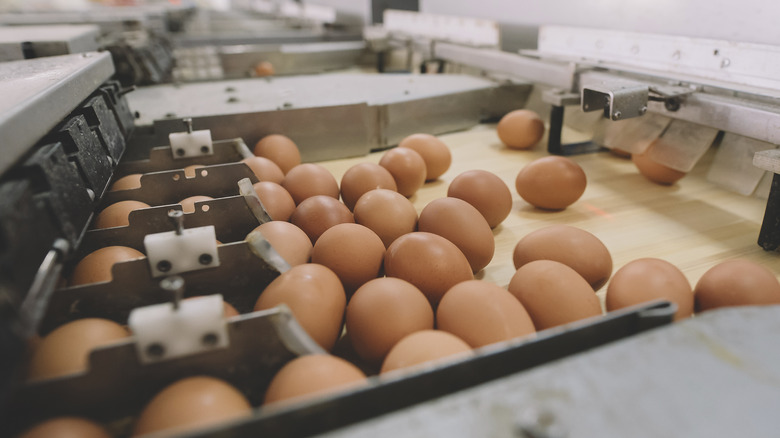Why Do We Refrigerate Eggs In The US?
Eggs are often referred to as the "perfect protein." Much of the credit goes to their nutritional value, but another reason to love eggs is they're capable of remaining fresh, safe, and delicious for longer than other protein sources — as long as they're stored in the refrigerator. As the U.S. Department of Agriculture (USDA) states, as long as you purchase eggs before their expiration or sell-by date, you've got up to five weeks from the date of purchase before they'll show signs of having gone bad. But, once again, this is only true if you consistently store your eggs in the refrigerator, per the Food and Drug Administration (FDA).
On the other hand, if you live in some countries outside the U.S., the rules may be different. For example, British eggs can stay fresh for up to two to three weeks at room temperature — i.e., 68 degrees Fahrenheit. The same is true throughout many countries in the European Union. Yet on both sides of the Atlantic, safe egg-handling guidelines are driven by the same concern: avoiding contamination with salmonella, a foodborne bacteria that is sometimes found in eggs and which starts to multiply at temperatures above 40 degrees Fahrenheit, according to the U.S. Food Safety and Inspection Service (FSIS).
So, if room-temperature egg storage is okay in other countries, why do we refrigerate eggs in the U.S.? As you're about to discover, it's got a lot to do with the applicable laws that govern egg handling prior to sale.
Most U.S. eggs are washed before sale
The U.S. sees about 1.35 million cases of salmonella annually, including 26,500 hospitalizations and 420 deaths, per the FDA. But it could be a lot worse given that all commercially produced eggs in the U.S. are required, by law, to be washed before packing. And many, including all USDA-graded eggs, are subjected to an additional sanitizing rinse as well. This practice began in the 1970s in the hopes of decreasing the frequency of salmonella and other foodborne infections. The rationale is that the eggshell is where most of the problematic bacteria can be found.
The catch is that the washing process eliminates a protective coating around the egg, thereby rendering the eggshell porous and making its interior vulnerable to bacterial contamination. That's why, once an egg has been washed, refrigeration at or below the temperature at which salmonella may multiply — i.e. the salmonella "danger zone" — becomes the only reliable means of ensuring bacteria present inside the egg remains in check. And therefore, not likely to cause infection.
Moreover, the egg's interior may already be contaminated with bacteria from the hen's reproductive tract, before it's even laid. Without proper refrigeration, that bacteria could multiply and eventually cause illness in humans — even when an egg has been washed. Accordingly, U.S. lawmakers have determined not only that the benefits of washing eggs prior to sale outweigh the risks, but also that continuous refrigeration of eggs is in everyone's best interest.
Avoiding the salmonella danger zone and other benefits of egg refrigeration
The FDA has enacted regulations to prevent contamination of eggs from the moment they're laid until the moment they reach the grocery store checkout line. U.S. law requires that immediately after going through the washing and sanitizing process, eggs must be consistently maintained at a temperature no higher than 45 degrees Fahrenheit until they reach the consumer, according to the FDA's Guidance for Industry with regard to commercial production, transportation, and storage of eggs.
Once eggs reach the consumer, egg safety is no longer subject to law, but rather, by common sense as informed by the collective wisdom of public health authorities. The USDA advises consumers to "take eggs straight home and store them immediately in the refrigerator set at 40 [degrees Fahrenheit] or slightly below."
Further, notwithstanding that many refrigerator doors come equipped with a handy egg container, many of which are designed with inserts for individual eggs, eggs should not be stored in the refrigerator door, which is subject to room temperature ambient breezes. Therefore, caution dictates storing eggs wherever your fridge is set to its coldest.
This two-pronged approach is designed both to inhibit bacterial growth and ensure optimal egg quality. And it's backed by science. A comprehensive 2018 study comparing U.S. egg storage practices with others found the U.S. approach to be the "most effective, ensuring the highest quality eggs after 15 weeks of storage."
Why don't other countries refrigerate eggs?
You may have heard or seen for yourself that the U.S. is fairly unique among nations in terms of its egg refrigeration practices. It's joined by a few others, including Australia, Japan, Canada, and some Scandinavian countries. But in others, including many in the European Union, storing eggs at room temperature is common practice. In Europe, the rationale is that because eggs are not washed, the protective membrane around the shell remains intact, staving off bacterial contamination and making it unnecessary to store eggs at colder temperatures.
But what about eggs that become contaminated while still inside the hen? In some European countries, egg-laying birds must be vaccinated against salmonella as a matter of law. That's not true of the U.S. "They're different approaches to basically achieve the same result," Vincent Guyonnet, a poultry veterinarian and scientific adviser to the International Egg Commission, told NPR.
But some might say that depends upon what you mean by the "same result." If you're talking about egg safety, Guyonnet says that salmonella infection rates are comparable. But that's actually true only up to three weeks after purchase. After that, refrigerated eggs can stay good for another two weeks, while room-temperature eggs should be discarded. And if it's egg quality you're contemplating, one needs only to reference the 2018 study mentioned above, which found that refrigerated eggs taste better for longer.
The only time you don't need to refrigerate eggs in the U.S.
All things considered, it seems safe to say that the only time you really don't have to refrigerate your eggs in the U.S. is when you're cooking with them. Or in the hour or two before you bake with them, if you're making something that requires room temperature eggs.
But there are some out there who maintain that if you raise egg-laying hens on your own property and handle both the hens and their eggs in accordance with applicable safety practices, then you don't have to refrigerate those particular eggs. Some even go so far as to say that the same rule applies to all eggs purchased direct from farmers, assuming the eggs were never washed.
The thing is, we've already established that refrigerated eggs stay fresh for longer and may, in fact, taste better. More importantly, since the USDA points out that the interior of an egg can become contaminated with bacteria from inside the hen's reproductive tract, we suspect it might weigh on us to see those eggs sitting out on the countertop at room temperature, day after day, knowing the salmonella danger zone begins at temperatures above 40 degrees Fahrenheit.
As registered dietitian Toby Amidor told Food Network, even "eggs that have just been laid by hens should be refrigerated immediately." Salmonella doesn't stop being a concern just because you know where the hen's been.




